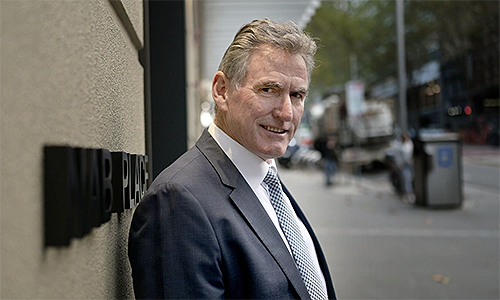
SPECIAL FEATURE:
by PAUL COLLITS – JUST recently, it emerged that two banks (NAB and Westpac) were closing branches in my second home town of Lithgow, NSW. And in many other regional towns across Australia.
The local paper in Lithgow stated: “This is a disgrace: National Australia Bank to close Lithgow branch.”
- Banks want customers. They need them to survive. They just don’t like dealing with them.
- There is a world of difference between customers wanting auto tellers and grudgingly accepting them.
- We-the-people have been unethically nudged by banks for a long time. Now they want to tell us what to think.
Influential Australian independent news site TOTT News has also weighed in, in the context of similar closures by Bankwest in WA. TOTT’s angle is the move by the banks to “going digital”. More on this below.
Yes, it is a disgrace. But this is not a new story. Corporate capitalism has been denuding the bush (and the suburbs) for several generations. This a story of ongoing disdain for the customer, of deft, self-serving and, ultimately, evil uses of technology and of “nudging”. Bullying and coercion wrapped in a “nice” package. And a story of globalism and the great reset.
PRESSURES
In the 1990s, Australian banks started closing branches in regional Australia. Banks had always been core businesses in country towns. Like post offices. Then corporate head offices, suddenly exposed to the felt pressures of “shareholder value”, figured out how to cut the ties they had always had with these communities.
It was called “technology”. God’s gift to the corporates. New technologies have been providing companies with ways to diminish services and employment since the invention of the microchip. (And earlier, of course).
Jeffrey Tucker in the Epoch Times laments “digital everything” and the way that technology now drives so much change for the worse: “Technology in the past infused the whole culture with a sense of optimism and hope that life would always get better.
“Is that still true? Not so much.
“I spent the weekend slogging through airports where the new technology drives everything. You can speed up your path through security with a retina scan that creeps out everyone who uses it and the employees, too. You encounter countless machines that require clicks, scans and apps, with an unrelenting flurry of codes and updates, as your phone battery drains and you are sent scrambling for a plug.
What has occurred has also been a relentless effort at reducing customer service. And ever-increasing surveillance.
And for Tucker, there was a COVID dimension to the march: “I was speaking to a driver of a shuttle service about some of this. He offered an interesting theory. He said that he always assumed that the real purpose of COVID-19 lockdowns was to give a test run to a totalitarian digital system. We went ‘touchless’. The government dropped money into our bank accounts. We spent that money on digital services, whether clicking for our groceries and food or watching stupid movies, because we were forced to stay home. The people without bank accounts were marginalised and excluded. The masters of the data ran the world for a time.”
They also became incredibly rich in that period, while our seeming luxuries were quickly inflated away with lost purchasing power and more dependence. It was his view that this was the purpose all along, the whole point of the exercise. It was an experiment in the ultimate dystopia and meant to be the template for how they really want to run the world.
I could not disagree. It does seem like the digital takeover of our lives has been dramatically advanced in the past two years. We are surrounded by screens, codes, authentications, lights, sounds and everything else.
TRANSITION
Surrounded by everything except bank branches! And yes, the banks as always were central to the COVID transition.
Tucker concludes: “We are supposed to be impressed and pleased by every new rollout. But it’s not impressive anymore and not pleasing either.
“None of this has the feel of progress. It has begun to feel like the opposite. When was the turning point? It’s not entirely clear. The internet in the early 2000s seemed like the greatest improvement in human knowledge and living standards ever. But after a quarter of a century of this stuff, where is the bounty? Where is the joy and opportunity? It seems like there is less of both than ever.”
With new technology, suddenly, the banks had found a way to cut costs. For them, not for us. This was the way of Australian capitalism, certainly from the 1980s. Cut costs to maximise profit. It was the Chainsaw Al Dunlap approach. Ruthlessly cut costs, and screwed the customer and the employee. The lazy way to achieve corporate success.
Now, thirty to forty years after the first phase of downsizing, the banks have come up with a new, 21st century narrative.
Here is the take-away line from the justification for the most recent branch closures: “With more customers choosing to bank online, over the phone, or by video – and because fewer customers are using branches to do their banking, we’ve made the difficult decision to close some of our branches,” the bank’s website said.
It comes as that bank recorded a strong lift in its cash profit to $7.7b, up 8.8 per cent.
Ah! It is all the fault of the customer!
From Bankwest and its delightfully named representative: “Bankwest General Manager for Personal Banking, Scott Spittles, said it would close its Maddington branch as ‘digital transactions surged’ and ‘demand for cash services declined’.”
REFUSED
On this model, rural customers drive for hours to a bank branch to get cash out, and are refused, as the TOTT News story explains.
“Demand driven! What a beautiful excuse it is. What changes this coverall reasoning allows. Customers really want to have fewer bank branches, fewer tellers, longer queues, impersonal transactions. Really? This is a sneaky narrative that aims to justify denuding suburbs and country towns of core services. It is an insult to suggest otherwise, adding to the injury.”
Let us for a moment set aside the cash profit figure. That speaks for itself. The more interesting and revealing line relates to the hidden nudging narrative. It is a lie. Two things are wrong about this classic, cliched corporate line. One, how do we know that customers “prefer” X over Y. What is the evidence? Two, customers were bullied into changing behaviour in the first place.
The banks love to lie. Just as their corporate fellows in other sectors do. Tell the big lie, then rinse and repeat. One writer, Paulo Rosa (a banker), has suggested that “nudging is the architecture of choice in the world of banking”.
Yes, indeed, the architecture of choice. Studying these trends is the stuff of behavioural economics. According to US economist Richard Thaler and US constitutional scholar Cass Sunstein, the very progenitors of this new way of the world – or at least they were the first to give it a name – a “nudge” is: “… any aspect of the choice architecture that alters people’s behavior in a predictable way without forbidding any options or significantly changing their economic incentives. To count as a mere nudge, the intervention must be easy and cheap to avoid. Nudges are not mandates. Putting the fruit at eye level counts as a nudge. Banning junk food does not.”
Thaler and Sunstein, as the godfathers of the nudge, inevitably cast their baby in a favourable light. It is all benign. It is “predictable”. It doesn’t forbid choice options. The aim is “better decisions and outcomes”. Well, no one disputes that technology has been better for the banks.
“We are only doing this because this is what our customers want.” Err, no. Customers were carefully nudged towards ATM-style banking a generation ago. There was never a customer-led demand for ATMs. The banks did this. It was their idea. They pushed it.
The supermarkets are up to it as well. Convince people to work for the corporates with self check-outs. Free labour. What a scam! There is a world of difference between wanting a new reality and grudgingly accepting it.
The banks introduced ATMs so they could close branches. And cut staff. End of story. It worked. We all fell for it. The lure of “convenience” was compelling. Especially for the young, who just love technology. Convince the customer that he is being clever. “Smart”.
And a whole generation walked into the trap. Had no idea what the corporate game plan was. And once ATMs (inevitably) proved acceptable – “what else could we do?” – it was inevitable that downsizing and off-shoring would occur.
You would now be doing your banking on the phone with heavily accented foreigners who make transactions somewhere between awful and unbearable. Branches would close. Branch managers would be stripped of their responsibilities and their prestige. Despite the fact that customers still need and value face-to-face interactions for many services. This was and is the banks’ false binary. Customers use (love?) ATMs. Ergo, we can cut F2F services. It was a self-fulfilling prophecy.
It is the same with cash. Gone! Without anyone noticing. We heard about Bankwest from TOTT News. Macquarie Bank, the so-called millionaire factory, is also going cashless. As is the Commonwealth, in some major city branches.
NUDGE
Suddenly, central banks and governments are phasing out cash. And they are up to their chins in the nudge toward central bank digital currencies (CBDCs). These will form a key pillar of the coming infrastructure of control, of which COVID vaccine passports were merely a taster. No wonder the globalists see Trump as such a threat, since he has declared war on CBDCs.
French politician Christine Lagarde, with an even better suntan than Stan Grant, announced the coming European digital currency late last year. It will be here in 2025. Next year.
“The euro is key to our European unity. A digital euro, existing alongside cash, would future-proof our currency. It would be safe, easy to use and free of charge. While the decision whether to issue a digital euro will be taken later, we’re now launching the preparation phase.”
TOTT News sees going cashless as the very purpose of the current wave of branch closures. 7-Eleven is closing ATMs. Writing cheques will be gone by 2030. Banks are talking biometric identity checking.
These digital currencies will allow the banks total control of spending. Way beyond monitoring. Again, it is technology that is allowing this. The very same driver of the branch closures, which were really only bank control 1.0. Very 20th century. Now we are living through the end times for bank branches. Control 2.0.
Of course, we now know, thanks to Nigel Farage, that banks close down the accounts of people who are in some way inconvenient to them. Yet more customer service! And, post the Canadian truckers and their supporters, we now know that the banks steal from customers on behalf of government.
So, closing bank branches is merely part of a much bigger game. As US author Dr Joseph Mercola explains:
- In mid-July 2023, Chase Bank closed my business accounts, along with the personal accounts of my CEO and CFO, and the accounts of their spouses and children.
- Chase Bank has close relationships with the technocratic control network that is trying to usher in a one world totalitarian government, and debanking is the weaponisation of finance for the purpose of social control. By debanking us, Chase Bank has given people a foretaste of how central bank digital currencies (CBDCs) and social credit scores will be used to control the masses.
- JP Morgan Chase CFO Lori Beer became a member of the Cybersecurity & Infrastructure Security Agency’s (CISA) newly launched Cybersecurity Advisory Committee in December 2021. So, JP Morgan Chase has been advising a federal agency, CISA, on how to most effectively censor and control Americans.
- Chase is also the only bank represented on CISA’s subcommittee on Protecting Critical Infrastructure from Misinformation and Disinformation. With everything we now know about CISA’s unconstitutional domestic censorship activities, it appears the weaponisation of finance was part of the plan from the start, and Chase has now tested the strategy of “punishment by association”.
- Chase Bank also has intimate ties to Bill Gates and the notorious paedophile Jeffrey Epstein. These connections link the bank not only to global child sex trafficking enterprises but also to Gates’ disastrous vaccine philanthrocapitalism, the hidden eugenics agenda and the heart of the One World Government cabal, the World Health Organization.
And that is just one bank. Not just any bank, though. Perhaps it is just coincidental that David Rockefeller, the godfather of globalism (or one of them) and harbinger of the new world order, was CEO of Chase Manhattan.
UK pharmacologist Mike Yeadon notes: “The head of that vipers’ nest [of global banks] is the Bank for International Settlements (BIS), founded between the wars, to which all national central banks (such as the Bank of England, the Federal Reserve Bank etc) all report.
“BIS is based in Switzerland, near to where WHO & WEF are based. They’re expressions of the same would-be One World Government.”
Yes, as Lenin (whose one 100th anniversary we remembered recently) said, everything is connected to everything else. And with the coming “singularity”, aka AI, it won’t even be Bolshevik humans controlling us, but machines. Only a bit more sophisticated than ATMs.
The nudging of banks and fellow corporates has a demographic dimension, too. It has been a generational nudge by the corporate class. The young and clueless are particularly prone to the Faustian bargain – tech toys and convenience traded for service and privacy, neither of which they understand.
The generation currently occupying God’s green earth has been convinced that it is alright for the customer to, in effect, work for the company. Without any reward. Every good online review we spend our time writing is money off the producer’s marketing budget. The customer as co-producer has even generated a literature, and the inevitable jargon, such as “co-creator”.
In essence, co-creation is simply working with your employees and customers to create products and services you know they’ll love. Instead of waiting until a new product is almost finished, you make customer feedback and ideas central to development from the very beginning.
Co-creation has been a masterful corporate ruse.
Back in the 1990s, there was a resistance to the closure of bank branches. This was the era of micro-economic reform, deregulation and economic rationalism. The National Party and One Nation led the charge against the worship of the market when it led to the removal of services in the cause of efficiency and, inevitably, profits. And the god of competition policy.
Then Senator Ron Boswell, for example, was a hero. He led the charge on the basic philosophy that we weren’t just “customers” and that, therefore, policy should not simply allow essential services to be denuded. Citizens also had a stake in ensuring an adequate level of service provision. For the critics of competition policy, like Bosell, this meant “nudging” businesses. To remain faithful to the communities they had previously served, and which had supported them over the years. Protectionism of sorts, but in this case, it was in the interests of consumers.
MISTAKEN
It is sad to reflect on the fact that deregulation over thirty years has not served the customer well. Competition policy has not led to greater competition, as economic theory suggested it would. Like everything else, deregulation requires good actors in order for it to work. Certainly, to work to the advantage of customers. And so many businesses now cannot remotely be mistaken for being “good actors”.
There is a longed-for but often hidden assumption in much discussion of business that “the customer is always right”. Well, Quentin Letts of The Daily Mail suggests that, in reality, “the customer is never right”.
He refers to the British Tory Minister and former (and possible future) leadership aspirant, Penny Mordaunt’s call for 2024 to be the year “we make the customer king again”. Letts doesn’t like her chances of success.
According to Lett’s piece in The Spectator magazine: “Penny Mordaunt, who carried her sword with such panache at the coronation, has called for 2024 to become the year we ‘make the consumer the king again’. I like Mordaunt. You should see the way she demolishes her Labour and Scots Nats counterparts in the Commons. But with her call for customers to be treated as monarchs, she may face an unwinnable battle. Businesses regard customers not as kings but as potential muggers, racists and a thoroughly dodgy lot.”
Letts has some examples of the genre: “Here are some signs seen in shops and cafés. Exhibit one: ‘Zero tolerance. Shouting, being disrespectful or abusive towards staff will not be tolerated at any time. Our hardworking, amazing staff have the right to be treated with dignity and respect at all times’.
“Exhibit two: ‘Our people are people too. Please respect our team so we can create a positive retail experience’.
“Exhibit three: ‘Zero tolerance policy. We will not tolerate any forms of sexual harassment, aggression, racism, misogyny, LGBT phobia, religious bigotry’.
“Exhibit four: ‘Giving money or food to people outside our store is encouraging theft, aggressive behaviour and substance abuse. There are many charities that would love your support. Please consider before handing over any money outside our store’.”
The customer is wrong, as it happens.
Letts concludes: “The customer as king? Dream on. The customer is a lackey and a nuisance. Have a nice day.”
The London Telegraph asks: “Why aren’t we being served?”
Then proceeds to its own examples: “You book an appointment to have your boiler looked at. The company can’t do it until next Wednesday and gives you a slot ‘between 8am and 6pm’. You cancel everything and wait…
“At least it gives you time to call your phone company to query a charge on your bill. A message says, ‘We are currently experiencing a high volume of calls – someone will be with you shortly.’ After 25 minutes, you’re still waiting… When, at last, a human answers, you’re transferred through a series of departments, then the line goes dead.
“Meanwhile, you were expecting a delivery an hour ago. On the doormat you find a note saying they knocked but there was no reply, and the package can now be collected from a pick-up point.
DEFICIENT
“Standards of customer service in telecoms, banking, retail and energy have ‘plumbed new depths’, according to research published in December by consumer organisation Which?. Customers struggle with waiting times, deficient chatbots and poorly trained staff. The report cites a case in which a priority customer (one considered vulnerable or at risk) was sent an incorrect bill for £8000 by British Gas and spent months juggling calls, emails and live chats.
“Customer satisfaction is at its lowest level since 2015, says The Institute of Customer Service (ICS) – and falling at the fastest pace on record.
Has anyone noticed this?
“The lingering effects of the pandemic have exacerbated things, with even more companies removing phone numbers from websites.” [emphasis added]
The death of British customer service, says The Telegraph. Rinse and repeat Down Under. And the disappearing banks appear to be on board, totally.
How could anyone forced to endure call centre queues, unintelligible instructions as to what buttons to press, long waits and the ever-present nudge to “go online” rather than to speak to a service provider, possibly believe that the customer is valued? This version of the nudge involves making the service provided so unpleasant for the customer that he or she will reluctantly choose the less worse option. Lengthen queues in assisted checkouts, so the customer with only a few (price-gouged) items will end up at the self-serve. Lengthen call centre queues – “we are experiencing longer than normal call wait times” … blah blah blah – so the customer will go online. All wrapped up in a bald-faced lie, viz. “we value our customers”.
As I have said in other contexts, they do think we are stupid.
No, the customer is not remotely valued. One is reminded of this when confronting the slightly unnerving, perhaps even sinister greeting upon arrival at the shop. It is a greeting-with-warning. Be nice to our staff. It is the implied “or else” that is most confronting. This is the customer-as-threat business model.
I don’t know if they ever think – why are customers rude to staff, or at least angry at them? Answering this question rather than confronting customers with implied threats upon arrival might improve customer relations.
But if you have left town, as the banks are again doing across the wide brown land, confronting angry customers F2F just won’t be a problem.
Businesses want customers. They need them to survive. They just seem not to like dealing with them. It would be nice if businesses came around to the view that they should behave as if they needed and wanted customers.
To recognise the corporate tricks of the trade isn’t a new form of Luddism. Nor is it to ignore the fact that customers can be rude. Nor is it the suggestion that banks should be charities. But there is “ethical nudging” and nudging. We-the-people have been unethically nudged for a long time. By businesses.
HOW TO VOTE
And now, they want to tell us what to think, how to vote and how to live. And they all fly off to Davos every January to figure out new and painful ways to achieve this. The richest bankers of them all are there, every year, in force. With names like Rockefeller and Fink. Closing a few more bank branches will, in short order, be the least of our worries.
Let us leave the last word to American libertarian Jeffrey Tucker.
What we have inherited is: “… a real leviathan that is arguably more of a threat than any we’ve faced in the past. I could not anticipate this (though I’m sure many did), but there is no use in denying it now. What they call ‘progress’ today isn’t really that at all. It is taking us back to a form of government we thought we had left in the past; a high-tech version of feudalism. It’s becoming a convenient form of slavery.
“The question remains: Who exactly is benefiting from this transition? It’s certainly not the masses of people.”
Indeed. Every last piece of new technology is steering us away from customer service and towards tyranny.
And it all works in favour of what US political satirist CJ Hopkins has termed “globocap”. Not us.PC













There are some customer owned banks, former building societies, that offer alternative and good service, Newcastle Permanent for example still has many branches and ATMs.
The big banks are big because of the deposits they hold. Take away the deposits, they’re not big any more.
Banks, as pointed out, went through a massive program of shutting branches across the country in the 1990s. And then they realised that without those many small depositors, they were screwed. Before they realised that, however, many towns initiated their own solution by funding a bank franchise – often with Bendigo Bank.
There are many alternatives to the big four banks. Look up the Customer Owned Banking Association.
https://www.customerownedbanking.asn.au/